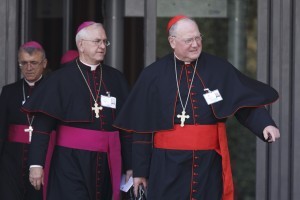 The Record and Catholic News Service
The Record and Catholic News Service
VATICAN CITY — To evangelize means to help people understand that God himself has responded to their questions, and that his response — the gift of salvation in Jesus Christ — is available to them as well, Pope Benedict XVI said.
“Our role in the new evangelization is to cooperate with God,” the pope told the more than 260 cardinals, bishops and priests who are members of the world Synod of Bishops on the new evangelization. “We can only let people know what God has done.” The synod formally opened Oct. 7 with a Mass in St. Peter’s Square.
Among those sitting before the pope was Archbishop Joseph E. Kurtz, one of seven bishops from the United States to have an active role in what is officially known as the 13th General Assembly of the World Synod of Bishops.
During the synod’s second working day, Oct. 9, Archbishop Kurtz presented his “intervention” or brief presentation to the delegates. In his allotted five minutes, he spoke to them about the new “Blessing of the Child in the Womb,” a blessing rite that he hopes the church will adopt world-wide.
The ceremony, Archbishop Kurtz said, is a “pastoral moment of first evangelization of the child and new evangelization of the family.” The archbishop noted that the blessing reaffirms a widely contested ethical teaching on abortion while inviting the family to prepare the spiritual life of its newest member.
“This sacred gesture is both a positive and hope-filled way to announce to society the great gift of human life as well as a gracious invitation for the parents to begin steps for the baptism of their child, once born,” added the archbishop, who formerly served as bishop of the Diocese of Knoxville, where the “Blessing of the Child in the Womb” was created.
At the end of each of the synod’s first three days Archbishop Kurtz took to social media to both blog and “tweet” about his experiences.
In his Oct. 9 blog posting, he noted that the synod is a “ ‘new song’ to the world from the Church, which is announcing anew Christ, who is the same yesterday, today and forever.”
The archbishop also noted that a national commentator expressed the fear that the synod “would simply be ‘the Catechism of the Catholic Church with a smile.’ ”
“If not for Christ,” Archbishop Kurtz wrote, “the new evangelization would simply be a human activity and indeed be susceptible to a distant and shallow smile, with no change. However, with Christ, the same yesterday, today, and forever, the truth of Christ is proclaimed but in a way that calls us to a deep smile that flows from the joy of his revelation.
“Thus the Church proclaims the good news so beautifully captured in the Catechism of the Catholic Church,” he wrote, “but one in which Christ calls us to extend his loving invitation.”
Archbishop Kurtz said that he was sitting in the sixth row at the synod, “very close to the speakers and quite absorbed in the presentations.”
“The content will be distributed through the Vatican News Office,” he wrote, “but what may not come through the official channels is the effect on my heart and, I suspect, on so many delegates. It is simultaneously overwhelming and intriguing to experience the rich tapestry of voices from every corner of the world.
“I recall the quote from Cardinal George, who speaks of the Church’s primary task … ‘to introduce Christ to the world in every generation.’ ”
Archbishop Kurtz will continue to use blog posts and Twitter messages during the duration of the month-long synod. His blog is being kept on the archdiocesan website, www.archlou.org. These posts and other synod-related stories also are available on The Record’s site, www.therecordnewspaper.org.
In a 21-minute, off-the-cuff reflection during morning prayer at the synod’s opening session Oct. 8, Pope Benedict spoke of the importance of prayer in the church’s push for a new evangelization, the meaning of evangelization, and sharing the Gospel through both proclamation and charity.
The pope examined the use of the word “evangelion,” the Greek term that is the root of the English word “evangelization,” and which is itself translated as “Gospel.”
In the Book of Isaiah, he noted, the Hebrew equivalent of the word describes “the voice that announces a victory, that announces goodness, joy and happiness,” transmitting the message that “God has not forgotten his people,” and that he intervenes with power in history to save them.
In the New Testament, the pope said, “evangelion” is the good news of the incarnation of Christ, the coming of God’s son into the world to save humanity.
For the people of Israel suffering under Roman rule, it was truly good news that God spoke to his people and came to live among them, the pope said. News of Jesus’ birth was the answer to those who questioned whether there really was a God; whether he knew his people and the circumstances of their lives; and whether he had any power to change their situation.
When Christians evangelize, they must remember that their “faith has content,” and that what they believe and seek to share with others is outlined in the creed, he said. They must use their intelligence to reflect on the tenets of their faith and use their mouths to proclaim it.
“Being tepid is the greatest danger for Christians,” he said. “We pray that faith becomes like a fire in us and that it will set alight others.”
